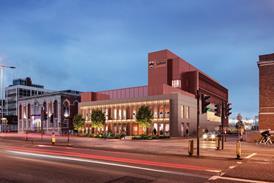Gentrification by creatives is threatening the viability of many western cities, runs the well-worn narrative. But some are avoiding it and we must learn from them, writes BD’s new urbanism columnist, David Rudlin

There is a tower in Cork. At 17 storeys it is not a very tall tower even if it is reputed to be the tallest in Ireland. It was completed just before the Celtic Tiger crashed and is only now fully occupied by bright young things working for Apple and other tech firms that have made Cork their European base. It is called the Elysian Tower, no doubt named by a marketing firm long before the film of the same name was released. For those of you who have not seen the film, the Elysians are a leisured elite orbiting in a giant space ship over the earth that has become one immense shanty town – spoiler alert, it doesn’t end well.
The Academy of Urbanism has just held its 13th congress in Cork and much of the debate revolved around our keynote speaker, Richard Florida, who was talking about just this sort of issue. It is fair to say that there was a degree of hostility in the hall towards Richard, not so much for what he was saying, but to some of the language used. To our ears the language of class grated a little: the “creative class” (the Elysians, you might call them) and the servant class – sorry, “service” class – who would no doubt be living back on shanty town earth.
Florida has rightly pointed out that the success of cities in the modern age revolves around the creative class, a group that makes up between 30% and 50% of a city’s population. He was the first to show, for example, the remarkable correlation between the percentage of gay people in a city and its economic success – and to be heavily criticised by conservative groups for doing so. The creative class are liberal, open-minded types who are attracted to diverse tolerant places. Companies deciding where to locate seek out these people and therefore also like tolerant open diverse cities, even if it means paying over the odds to be in New York, London and Dublin. As he describes it, in coming up with this idea he turned on its head economic theory about where companies locate and got city authorities to think very differently about how to make their cities attractive to these magic people.
But, as his new book relates, it has all gone too far. The economic pressures resulting from the conversion of cities to this creative economy have pushed up values to the point that inequality has spiralled out of control and the service class can no longer afford to live within reach of where they work. The result is both socially unacceptable and self-defeating (because it is damaging to the creative economy). Artists will be squeezed out; start-up business will struggle to find premises and staff; and the city will become the sanitised domain of the rich and boring (or so Kevin Baker argues in his cri de cœur about the death of New York from affluence).
Our delegates weren’t so sure. Florida presents his arguments as if this is a world crisis but what of cities like Helsinki that seem immune to the crisis despite a thriving creative economy? Indeed one might argue that the crisis only really affects the English-speaking world in thrall to the free market and disdainful of welfare systems and particularly social housing. Proper social housing was always the way we dealt with the problems of creating mixed communities in expensive cities: housing that isn’t subject to the vagaries of a market in which foreign investors use it as a safe place to put their money, heedless of the need to actually house people.
But take the argument a step further and maybe it isn’t even the whole of the English-speaking world. It affects Dublin but not really Cork; London but less so Britain’s provincial cities. The Elysians in their tower in Cork have not made the city unaffordable – not yet at least.
As we heard, the city is planning to grow rapidly over the coming decades and it is within the power of the city authorities to shape how this growth takes place. Florida was right to identify the importance of the creative class and the transformation of Cork through companies like Apple is amazing. But the new urban crisis is the result of the unfettered workings of the market rather that a bunch of tech workers in a tower with an inappropriate name. We need to learn from Scandinavia and elsewhere in order to create inclusive cities that can withstand the pressures of success. Otherwise we might just as well go back to the declining cities that were the norm until the last few decades.
Postscript
David Rudlin is chair of The Academy of Urbanism and director of urban design consultancy Urbed.
















4 Readers' comments